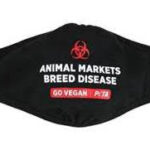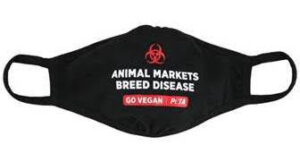 As New South Wales battles its latest surge in COVID-19 cases and Premier Gladys Berejiklian has mandated mask-wearing, People for the Ethical Treatment of Animals (PETA) has sent her a printed mask, which reads, “Animal Markets Breed Disease.” It serves as a reminder that humankind’s abhorrent treatment of its fellow animals is the cause of this zoonotic disease – and numerous others.
As New South Wales battles its latest surge in COVID-19 cases and Premier Gladys Berejiklian has mandated mask-wearing, People for the Ethical Treatment of Animals (PETA) has sent her a printed mask, which reads, “Animal Markets Breed Disease.” It serves as a reminder that humankind’s abhorrent treatment of its fellow animals is the cause of this zoonotic disease – and numerous others.
In an accompanying letter, PETA points out that while COVID-19 is believed to have originated in a wildlife market, zoonotic diseases are not limited to wild animals. As far back as 2016, the UN Environment Programme warned that the “livestock revolution” increases the likelihood of disease transmission, and experts are deeply concerned about future swine and bird flu outbreaks.
In 2009, the Department of Health recorded 191 deaths out of 37,537 confirmed cases of H1N1 influenza (swine flu), and this July and August, six Victorian farms reported three different strains of avian influenza, proving that Australia is at risk of such outbreaks. In fact, in a paper published in 2018, Belgian spatial epidemiologist Marius Gilbert found that more historical “conversion events” for bird flu – in which a not-very-pathogenic strain of the virus becomes more dangerous – had occurred in Australia than in China.
“Of course, human consumption of animal flesh also increases the risk of developing illnesses such as heart disease … and contributes considerably to anthropogenic climate change,” writes PETA spokesperson Aleesha Naxakis. “In addition, there’s the horrific toll on animals. Annually, some half a million living, feeling beings are callously slaughtered in Australia to meet the demand for their flesh. Each was an individual, just like the cats and dogs with whom we share our homes. Sadly, unlike our companion animals, those bred for meat endure miserable lives in captivity before being killed.”
PETA – whose motto reads, in part, that “animals are not ours to eat” – opposes speciesism, which is a human-supremacist worldview.
PETA’s letter is available here. For more information, please visit PETA.org.au.















